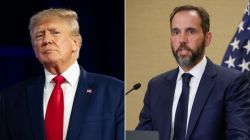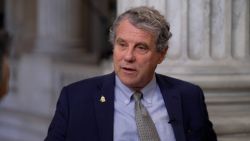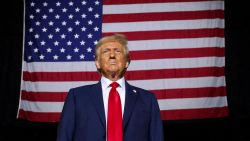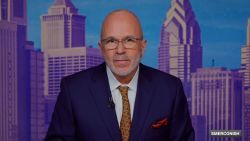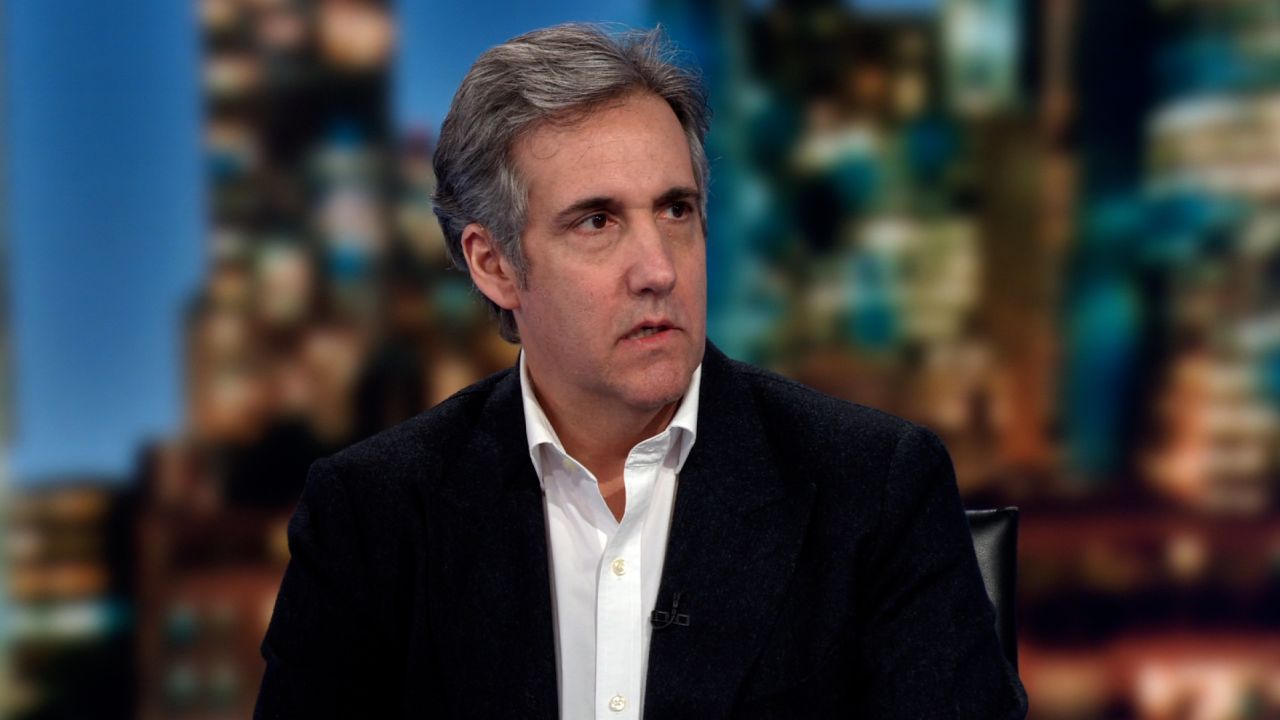Every day, America gets dragged deeper into Donald Trump’s legal, political and constitutional morass.
This plight was exacerbated by a day of raw drama Thursday in a handful of cities, in multiple cases involving defiant personalities often trading personal smears that tightened the fateful knot between the 2024 election and the ex-president’s staggering legal battle.
By nightfall, new truths had emerged about Trump’s fight for his fortune and political career and looming months certain to leave the nation even more estranged, especially as millions of his supporters believe his claims of political persecution.
- A judge in New York dismissed the last obstacle to the first-ever criminal trial of a former president. Jury selection will begin on March 25 in Trump’s hush money trial. A guilty verdict could mean this year’s potential GOP nominee will be a convicted felon. But if he’s found innocent by a jury of his peers it could also transform the election.
- The ex-president’s election interference case in Georgia is on a knife-edge after an head-spinning day when two prosecutors were effectively put on trial themselves over a romantic relationship that defendants say should disqualify them and end the case. Even if they survive, Trump and his co-accused may have won the day after taking the chance to malign the prosecutors and to brand them as corrupt and unethical.
- Trump’s lawyers made a final, beseeching plea to the Supreme Court to stop the clock in a federal trial over his attempt to overturn the 2020 election. Justices must now decide whether to take up one of the most profound cases in the body’s history.
- A special counsel charged a former informant with lying about the Biden family’s role in Ukraine, potentially dealing a massive blow to vital testimony Republicans have used to justify an impeachment inquiry into President Joe Biden.
- Trump is braced for a potentially devastating outcome to a civil fraud trial as soon as Friday. A huge slice of the ex-president’s fortune is at risk along with his capacity to do business in the city where he built skyscrapers and his art of the deal mythology.
The ex-president has pleaded not guilty and denied wrongdoing in all cases. But at the end of a tempestuous day, his legal strategy was clearer than ever. First, seek to delay any trials or potential convictions until after the election. Second, allege criminality by those who are calling him to account. Trump’s last resort is a coordinated effort to impugn prosecutors, judges and courts to hedge against any possible guilty verdicts and to destroy their credibility among undecided voters.
Gripping and humiliating testimony in Georgia
Everything involving Trump devolves into a circus. So, it was in keeping with the times that the confirmation that a former commander-in-chief will face a criminal trial for the first time ever ended up being overshadowed.
The distraction was a televised courtroom battle over claims by Trump and co-defendants that Fulton Country, Georgia, District Attorney Fani Willis and a special prosecutor she appointed accrued financial gain during a romance.
One of Trump’s co-accused, Michael Roman, has called for Willis to be dismissed and for the case to be thrown out, alleging that she and special prosecutor Nathan Wade, with whom she had a previous relationship, are conflicted.
The stakes are enormous. If Willis is dismissed, the case will be sent to a jurisdiction outside Fulton County – a process that could take months, change the nature of the prosecution and certainly delay it until after November’s election. Like the New York hush money prosecution, the Georgia case is significant because as a state matter it is outside Trump’s potential capacity to halt if he wins the White House. And presidential pardon powers do not extend to such cases.
“This case never ceases to amaze me,” Darryl Cohen, a former assistant district attorney in Fulton County who knew key figures in the case, told CNN’s Erin Burnett.
“I watched Fani walk into that courtroom, she was walking in hot. … I thought we were watching a heavyweight fight,” Cohen said. “The bottom line is does it matter? Does this take anything away from the facts of the case? My answer is, it does not. It is a sideshow that has legs for the moment.”
In dramatic testimony, Willis denied she had benefited from thousands of dollars in taxpayer funds paid to Wade him while the then-couple were on lavish vacations and on cruises. She said she reimbursed him in cash for travel expenses, saying that was a practice she learned from her father. This also explained why there was no paper trail for the transactions.
The burden is on the defense to show Willis and Wade erred. It was not clear at the end of a day of intense exchanges that any of the lawyers arrayed against her had proved any evidence of corruption. Similarly, it would be hard to argue that any of the details that emerged prejudiced the capacity of Trump and his co-defendants in the vast racketeering case to get a fair trial.
That leaves the ethical conduct of Willis and Wade, and the perceptions that they faced a conflict of interest.
One legal analyst, defense attorney Caroline Polisi, argued that testimony from Robin Yeartie – a former co-worker and friend of Willis – that the relationship started well before the 2022 date named by both the district attorney and Wade could mean they had mislead the court.
“An attorney lying to the court is not good,” Polisi told CNN’s Anderson Cooper. Several other observers, however, warned that Yeartie, as a disgruntled former employee, did not come across as a credible witness.
But even if Willis and Wade are not disqualified, Thursday’s hearing – in which both were forced to answer humiliating questions on television about their sex lives and claims they were guilty of severe misconduct – served Trump’s purposes in seeking to taint their reputations and potential credibility ahead of a trial. The hearing, which was on television for hours, may have even influenced a future jury pool and Yeartie’s testimony is likely to fuel days of conservative media accounts.
And as Willis pointed out, the spectacle had the impact of taking the focus away from Trump and his co-defendants over an alleged attempt to steal the votes of thousands of Georgians.
“You think I am on trial. These people are on trial for trying to steal an election in 2020,” Willis said, pointing at the lawyers for Trump and his co-defendants. “I am not on trial no matter how hard you try to put me on trial.”
History beckons on March 25
Despite the drama in Georgia, history may most remember the moment on Thursday morning when Judge Juan Merchan rejected Trump’s calls for delays and a dismissal and confirmed the country will cross a constitutional and legal Rubicon on March 25. His decision to lock in the previously selected date means the hypothetical possibility of a front-running candidate going on trial months before the election will become a somber reality.
The case is considered by many legal experts to be the weakest of the four criminal trials Trump faces and relies on a somewhat novel legal theory. Even if he is convicted, Trump probably wouldn’t face jail time. But the spectacle of the United States putting its past and possibly future leader on trial will transfix the world. In itself, it represents a profound political and legal test for American democracy and the rule of law – even if it is only one of Trump’s legal threats.
Trump wasted no time in making clear how he intends to fight the case, emerging from the courtroom to vent to reporters in a pen of crash barriers, cutting a disquieting metaphorical image of a former president who almost looked like he was behind bars.
Trump accused Biden of “election interference” over the case, casting it as “the only way he can think to get elected because he’s accomplished nothing.” There is no evidence the White House intervened in any way in Manhattan District Attorney Alvin Bragg’s prosecution. Trump’s lawyer Todd Blanche told Merchan that the trial was unfair because the ex-president needed to campaign ahead of November’s election and called for a delay.
“What’s your legal argument?” Merchan asked.
“That is my legal argument,” Blanche replied, before the judge added: “That’s not a legal argument” as he adjourned the hearing.
By March 25, Trump may well have piled up most of the delegates he needs to win the Republican nomination. If he’s not the presumptive nominee already, he could be before a verdict lands in a trial that could last a month to six weeks.
In a normal election, Trump would be keen to turn his fire on his likely general election foe, Biden, by late March. But he will be forced to spend day after day in court in New York. Asked how he could possibly campaign, he responded: “I’ll do it in the evening.”
There is no way of knowing how voters will react if the ex-president is convicted despite some recent polls suggesting that some Republicans may be less likely to support him after a guilty verdict. No one wants to go on trial, but if there was one case that the ex-president would prefer to face before the election it is the New York one. And despite his claims that he’ll never get a fair trial in Manhattan, a not guilty verdict could send its own shockwaves through the electorate.
The former president’s politicized claims that he’s a victim of political persecution are only likely to be bolstered by news of a major development on Thursday that could undermine the House GOP’s impeachment goals.
Special counsel David Weiss charged a former FBI informant with lying about the president and his son Hunter Biden’s involvement in business dealings with Ukrainian energy company Burisma Holdings.
Alexander Smirnov, 43, was arrested Thursday at Harry Reid International Airport in Las Vegas, after his arrival in the US from overseas. Like any other defendant, Smirnov is entitled to the presumption of innocence. But because his evidence has been frequently cited by House GOP investigators, his arrest has significant political implications.


